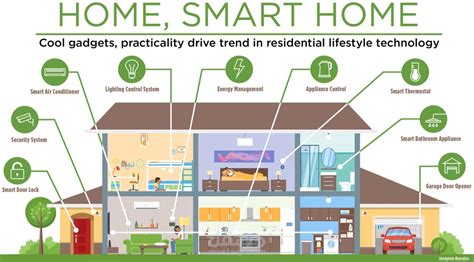The Rise of Smart Home Technology

Discover the benefits and impact of smart home technology on daily life, integration of systems, future trends, and advantages of devices.Smart home technology has been on the rise in recent years, revolutionizing the way we interact with our living spaces. From voice-controlled virtual assistants to automated lighting and security systems, the integration of smart devices into the home has become increasingly prevalent. In this blog post, we will explore the various aspects of smart home technology, its advantages, and its impact on daily life. We will delve into the definition of smart home technology, the numerous advantages of smart home devices, the seamless integration of smart home systems, and how these technologies are transforming the way we live and interact with our environments. Additionally, we will take a peek into the future trends of smart home technology and how it is set to shape the homes of tomorrow. Join us as we embark on a journey through the world of smart home technology and discover how it is shaping the way we live.
What is Smart Home Technology
Smart home technology refers to the use of devices in the home that are connected to the internet and can be controlled remotely. These devices are designed to make everyday tasks easier, more efficient, and even more secure. They can include everything from smart thermostats and lighting systems to security cameras and door locks.
One of the key features of smart home technology is the ability to automate tasks and control them remotely using a smartphone or voice commands. This can help to save time and energy, as well as improve safety and security in the home. For example, a smart thermostat can learn your schedule and adjust the temperature accordingly, while a smart security system can send alerts to your phone if it detects any unusual activity.
Overall, smart home technology is designed to make our lives more convenient, comfortable, and secure. It offers a wide range of benefits, including energy savings, improved home security, and the ability to monitor and control devices from anywhere. As technology continues to advance, we can expect to see even more innovative and integrated smart home solutions in the future.
Advantages of Smart Home Devices
Smart home devices have revolutionized the way we live, providing numerous benefits that make our lives more convenient, efficient, and secure. One of the main advantages of smart home devices is the enhanced home security they offer. With features such as smart locks, security cameras, and motion sensors, homeowners can remotely monitor their properties and receive real-time alerts about potential threats. This not only gives them peace of mind but also deters intruders and reduces the risk of break-ins.
Another significant advantage of smart home devices is the energy efficiency they bring to our homes. Connected thermostats, smart lighting, and energy monitoring systems enable users to control and optimize their energy usage, leading to lower utility bills and reduced environmental impact. Additionally, these devices can automatically adjust settings based on user preferences and environmental conditions, further optimizing energy consumption.
Moreover, smart home devices contribute to convenience and comfort in our daily lives. Voice-activated assistants, smart appliances, and automated routines streamline household tasks, making it easier for individuals to manage their homes and schedules. From setting the ideal temperature and lighting levels to remotely controlling household devices, smart home technology simplifies everyday chores and allows for a more comfortable living environment.
Integration of Smart Home Systems
Integration of smart home systems refers to the interconnectedness of various smart devices and appliances within a home, creating a seamless and unified experience for the homeowner. This allows for the automation and control of different aspects of the home, such as lighting, heating, security, and entertainment, through a centralized system.
This integration is made possible through the use of internet of things (IoT) technology, which enables devices to communicate with each other and be remotely controlled through a smartphone or voice command. This level of connectivity and convenience has revolutionized the way we interact with our homes, making everyday tasks more efficient and effortless.
Furthermore, the integration of smart home systems can lead to significant energy savings and improved security, as devices can be programmed to adjust settings based on occupancy or to send alerts in the event of suspicious activity. It also allows for greater accessibility and customization, as homeowners can tailor their smart systems to fit their specific needs and preferences.
Impact of Smart Home Technology on Daily Life
The Rise of Smart Home Technology
Smart home technology has become an integral part of daily life, revolutionizing the way we interact with our living spaces. The integration of smart home systems has had a profound impact on various aspects of our daily routine, from convenience and comfort to safety and energy efficiency.
One of the major advantages of smart home devices is the ability to remotely control and monitor household appliances and systems. With the use of smartphones or voice commands, individuals can adjust lighting, temperature, and security cameras, providing a sense of control and security even when away from home.
The impact of smart home technology extends beyond convenience; it also plays a significant role in energy conservation and sustainability. Smart thermostats and lighting systems can optimize energy usage, reducing utility bills and environmental impact. Additionally, smart home devices can enhance safety measures by alerting homeowners about potential hazards such as leaks or intruders.
Future Trends in Smart Home Technology
In the fast-paced world of technology, the future of smart home technology seems to be constantly evolving. With advancements in artificial intelligence, machine learning, and internet of things (IoT), the future trends in smart home technology are nothing short of exciting. One of the most promising trends is the integration of voice assistants into smart home devices. This allows for seamless control of various devices using just the power of speech, making the user experience more natural and intuitive.
Another trend to look out for is the increased focus on energy efficiency in smart home technology. With the rising awareness of environmental issues, smart home devices are being designed to consume less energy while still providing the same level of convenience and functionality. This not only benefits the environment but also helps users save on their utility bills, making it a win-win situation for all.
Furthermore, the future of smart home technology also includes the expansion of smart security systems. With more advanced sensors, cameras, and monitoring capabilities, homeowners can enjoy heightened levels of security and peace of mind. The integration of AI-powered analytics and facial recognition technology has the potential to revolutionize the way we think about home security, making it more proactive and intelligent than ever before.





